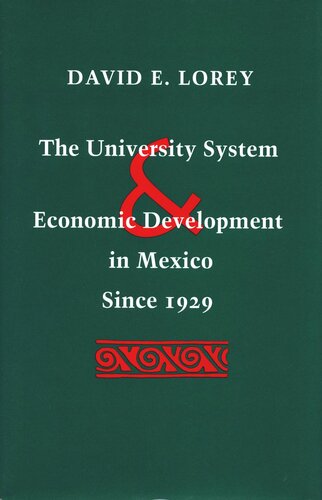

Most ebook files are in PDF format, so you can easily read them using various software such as Foxit Reader or directly on the Google Chrome browser.
Some ebook files are released by publishers in other formats such as .awz, .mobi, .epub, .fb2, etc. You may need to install specific software to read these formats on mobile/PC, such as Calibre.
Please read the tutorial at this link: https://ebookbell.com/faq
We offer FREE conversion to the popular formats you request; however, this may take some time. Therefore, right after payment, please email us, and we will try to provide the service as quickly as possible.
For some exceptional file formats or broken links (if any), please refrain from opening any disputes. Instead, email us first, and we will try to assist within a maximum of 6 hours.
EbookBell Team

4.0
46 reviewsFor decades, Mexican leaders and scholars as well as outside observers have spoken of a Mexican university system in crisis, expressing concern over student political activism and violence, declining quality of instruction and facilities, crowded campuses, and lack of employment for graduates. When the government harshly suppressed a student movement in 1968, world attention focused on the turmoil that was endemic in university life. During the severe economic slump of the 1980s, the fundamental weaknesses of the Mexican economy—its inefficiency and inability to compete in the world—were often attributed to failings of the university system. Using original quantitative data on the graduates of all Mexican universities in a dozen major professional fields since 1929, the author explores the nature of this purported "crisis" by examining a series of questions about the Mexican university system: How have the changing policy priorities of the Mexican government affected the university’s education of professionals? How have the Mexican economy’s needs for professionals shaped the functioning of the university system? Has Mexico trained "enough" professionals? Have they been trained in the "right" fields? Has the university been able to respond to demands for upward mobility through higher education? The author’s detailed analysis reveals a paradox: to the extent that Mexican universities may not be producing the kinds of expertise needed for competing in the new global marketplace, that educational quality has declined gradually over time, and that the university has not contributed much to social mobility, one may indeed speak of a crisis. Yet because the university system has reached its present form in response to demands placed on it be government, the economy, and society, responding pragmatically to circumstances beyond its control, the author concludes that the crisis is not fundamentally a university crisis, but rather one that lies in Mexican economy and society at large.